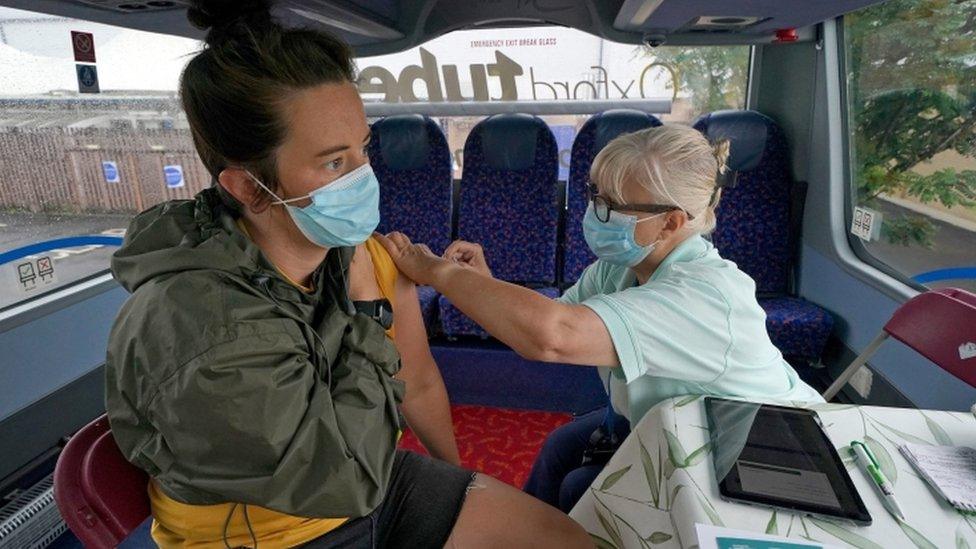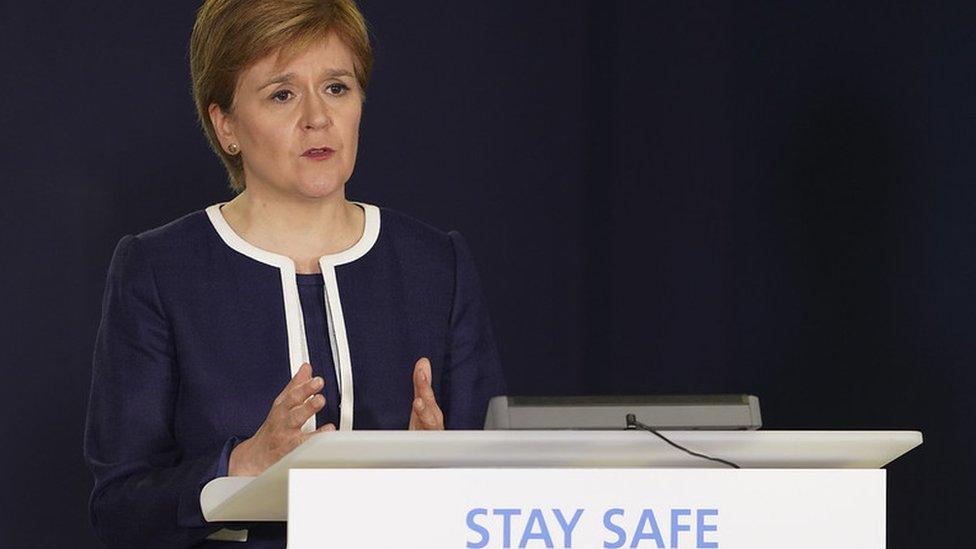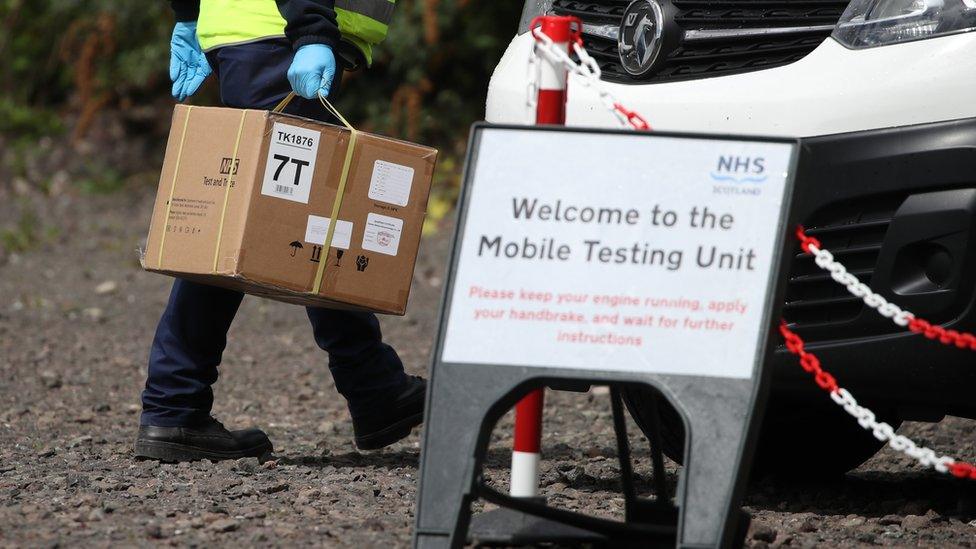Covid in Scotland: Nicola Sturgeon says surge in cases may be levelling off
- Published

The recent surge of Covid-19 cases in Scotland may be levelling off, First Minister Nicola Sturgeon has said.
A further 2,802 positive cases were recorded on Thursday, with Ms Sturgeon saying there was an "apparent slowdown" in the rise in infections.
She said this gave her cause for optimism that Scotland can move to level zero of restrictions on 19 July.
However she stressed that measures such as the use of face masks and physical distancing will remain for some time.
The Scottish Parliament will be recalled from recess next Tuesday for Ms Sturgeon to announce whether the easing of restrictions will go ahead as planned.
The 2,802 positive tests announced on Thursday represents a drop from the 3,799 logged on Wednesday.
A total of 401 people are in hospital with the virus, with 38 in intensive care, while a further four deaths have been registered.
Case numbers are now 1,432 lower than they were last Thursday, while the seven-day average also appears to show a slowdown in the rise of positive cases.
Ms Sturgeon said there was a "suggestion that the recent surge in cases may be to some extent levelling off now".
However, she said figures remained worryingly high and could still put pressure on the health service.
She said: "We increasingly hear talk of learning to live with the virus, which we all want to be able to do.
"It is true that we can't live a restricted way of life forever as that in itself affects our health and wellbeing, and vaccines are offering us an alternative way forward.
"However, that desire to just live with it cannot mean we simply throw caution to the wind and no longer worry at all about rising levels of infection."

The Scottish government's route map out of lockdown would see the whole of the country move to level zero of restrictions, external on 19 July, before scrapping most legal curbs altogether on 9 August.
A decision is to be taken on the first step on 13 July, and Ms Sturgeon said this would be based on a careful evaluation of the latest data.
She added: "I very much hope we will be able to move ahead as planned, and the apparent slowdown in case numbers gives me more cause for optimism about that than I might have had a week ago."
However, the first minister stressed that Covid "is going to be around for some time to come", and said this meant some curbs would have to remain.
She said: "Its important I think to remind all of us that a move to level zero does not mean the immediate end of all restrictions.
"Many of the baseline measures like face coverings, physical distancing, hand hygiene and advising on ventilation, these are going to continue to be important mitigations to protect us and others from the virus for some time yet.
"No matter what our decision is next week, there won't be an abrupt end to these basic protective measures when we do move to level zero."
Scottish Conservative MSP Craig Hoy said continuing uncertainty over what restrictions would ease and when were not helping people's business, holiday or wedding plans.
And he said it was "not good enough" that next week's statement would come just six days before the changes are due to come into force.

Ms Sturgeon said her government was currently reviewing its policy on self-isolation rules, including for workplaces and travellers, and would announce the outcome shortly.
The UK government has announced that fully-vaccinated people arriving in England from amber travel list destinations will no longer have to quarantine from 19 July.
The first minister also acknowledged the growing pressure on the NHS amid high case numbers, despite a lower proportion of people requiring hospital care.
Two hospitals in the north east of Scotland have reached full capacity, with calls for non-urgent procedures to be cancelled to ease the strain on services.


Hospitals are under pressure but it is different this time. Despite soaring case numbers, far fewer people are ending up in hospital with Covid. There's also some evidence that they don't need treatment for as long.
But hospitals are busier now than last year when many other procedures were postponed.
Health boards say the numbers of non-Covid patients they are seeing over summer is equivalent to that usually experienced in the busier winter months. Figures from Public Health Scotland show emergency departments faced their busiest ever May, with more than 112,563 attendances.
Add into that fewer available beds because of distancing requirements, juggling staff leave, staff sickness and self-isolation, and the already high vacancy rates in some areas. It doesn't take much before hospitals are at full stretch.
As ever, the NHS has to prioritise those most in need of treatment and that means some are already having to postpone non-urgent surgery.
The major burden on the NHS during this wave may turn out not to be Covid patients themselves but the wider impacts of the whole pandemic.

Chief Medical Officer Dr Gregor Smith said the remobilisation of the health service - with procedures delayed due to the pandemic now starting up again - meant hospitals were busier than normal with non-Covid work.
He added: "What I'm hearing from colleagues is much more in the way of very complex and often quite unwell people who are presenting, particularly either in community-based services or at emergency departments, with illness which necessitates hospital admission and where the length of stay is slightly longer.
"We are also seeing increased respiratory infections, particularly in younger children where we know we have an upsurge in parainfluezna, a type of viral infection, and that is having an knock on effect on people presenting to GPs and emergency departments with unwell children."

